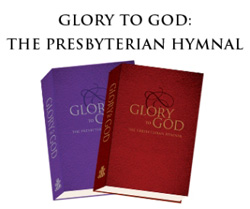Wrath of God verse roils hymnal group
NASHVILLE, Tenn. (ABP)—The wrath of God has become a point of contention since a new Presbyterian hymnal passed on “In Christ Alone” for theological reasons.
“Why do many Christians shrink from any thought of the wrath of God?” Keith Getty, who co-wrote the hymn—one of the most popular songs used today in churches across the United States and elsewhere—with British songwriter Stuart Townend in 2001, posted on the Getty Music website.
The Irish-born Getty, who now lives in Nashville, Tenn., with his wife, Kristyn, endorsed a First Things article by Baptist theologian Timothy George contending God’s love is inseparable from God’s wrath.
God’s love not ‘squishy’
“God’s love is not sentimental; it is holy,” said George, dean of Samford University’s Beeson Divinity School. “It is tender, but not squishy. It involves not only compassion, kindness and mercy beyond measure—what the New Testament calls grace—but also indignation against injustice and unremitting opposition to all that is evil.”
 George’s article came in response to an April Christian Century article describing “controversial issues” that confronted the Presbyterian Committee on Congregational Song as it worked on a new hymnal titled “Glory to God,” due out this fall.
George’s article came in response to an April Christian Century article describing “controversial issues” that confronted the Presbyterian Committee on Congregational Song as it worked on a new hymnal titled “Glory to God,” due out this fall.
Bringle, a professor at Brevard College in North Carolina, said the committee had concluded three-and-a-half years of quarterly meetings when disagreement arose in January 2012.
The group had voted for “In Christ Alone,” a song from the contemporary Christian canon, but altered a lyric from “as Jesus died/the wrath of God was satisfied” to “Till on that cross as Jesus died/the love of God was magnified.”
An email debate
When the authors refused to authorize the change, which they considered too great a departure from their original words, the committee debated by email whether to include the song with the original lyrics or remove it from the list.
“People making a case to retain the text with the authors’ original lines spoke of the fact that the words expressed one view of God’s saving work in Christ that has been prevalent in Christian history—the view of Anselm and Calvin, among others, that God’s honor was violated by human sin and that God’s justice could only be satisfied by the atoning death of a sinless victim,” Bringle said.
“While this might not be our personal view, it was argued, it is nonetheless a view held by some members of our family of faith; the hymnal is not a vehicle for one group’s perspective but rather a collection for use by a diverse body.”
“Arguments on the other side pointed out that a hymnal does not simply collect diverse views, but also selects to emphasize some over others as part of its mission to form the faith of coming generations,” she said. “It would do a disservice to this educational mission, the argument ran, to perpetuate by way of a new (second) text the view that the cross is primarily about God’s need to assuage God’s anger.”
A losing vote
The final vote was six in favor of inclusion and nine against, giving the requisite two-thirds majority to the no votes. “The song has been removed from our contents list, with deep regret over losing its otherwise poignant and powerful witness,” Bringle said.
George, who as a church history professor at Southern Baptist Theological Seminary in the 1980s was an early advocate of a resurgence of Calvinism in the Southern Baptist Convention, said the debate is part of a recent trend of treating God’s wrath as something shameful and best left in the closet.
“The result is a less than fully biblical construal of who God is and what he has done, especially in the redemptive mission of Jesus Christ,” George said.
“The full New Testament teaching about the cross involves both expiation, which means providing a covering for sin, and propitiation, which means averting divine judgment,” he wrote. “The semantic range of the Greek words hilasmos/hilasterion includes both meanings. That is why the wrath of God cannot be brushed out of the story without remainder.”
Gospel Coalition confessional statement
Getty has been featured at national conferences of the Gospel Coalition, a group of churches concerned about movements among evangelicals they believe depart from historic beliefs and practices. The group’s confessional statement includes a belief that “by his incarnation, life, death, resurrection and ascension, Jesus Christ acted as our representative and substitute.”
“He did this so that in him we might become the righteousness of God: on the cross he canceled sin, propitiated God, and, by bearing the full penalty of our sins, reconciled to God all those who believe,” the statement says.
“We believe that Christ, by his obedience and death, fully discharged the debt of all those who are justified,” it continues. “By his sacrifice, he bore in our stead the punishment due us for our sins, making a proper, real and full satisfaction to God’s justice on our behalf.”
The hymnal panel said the next Presbyterian collection of hymns and songs will be published amid different conditions than those that molded previous ones.
“It will be used by a church many of whose members have not had lifelong formation by Scripture and basic Christian doctrine, much less Reformed theology,” said a statement on the Presbyterian Hymnal Project website. “It is meant for a church marked by growing diversity in liturgical practice. Moreover, it addresses a church divided by conflicts but nonetheless, we believe, longing for healing and the peace that is beyond understanding.”